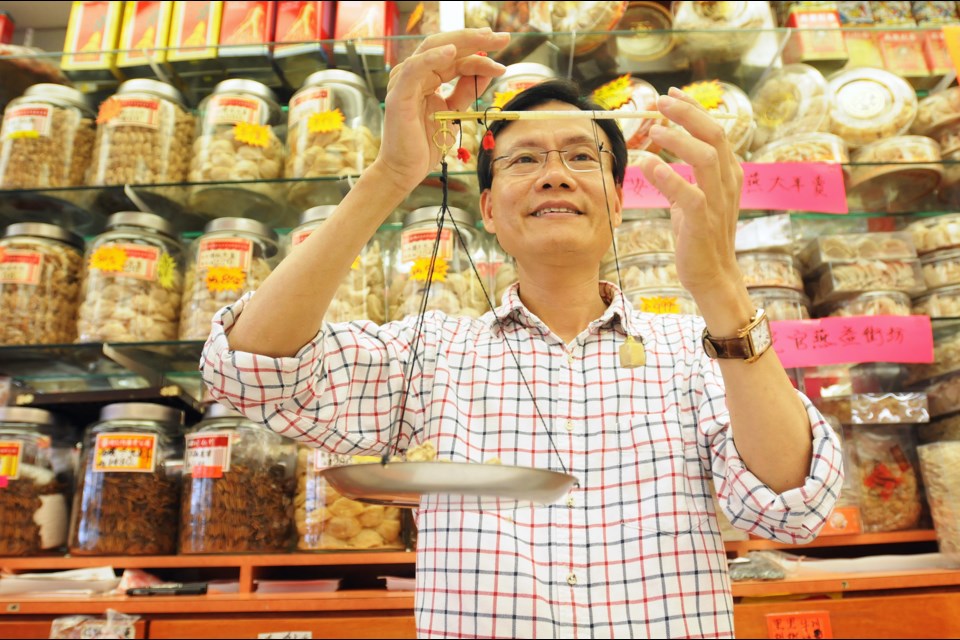“The flavour is changing,” said Michael Chung as he looked out across Main Street at the first Starbucks in Chinatown tucked underneath a new nine-storey, 81-unit condo.
But instead of fearing the changes it represents for the neighbourhood, Chung says herbal medicine shops like the one he has worked in for six years, Cheung Sing Herbal and Birds Nest Co., will live on for at least another decade.
The roughly dozen ornate herbal medicine shops lining the arteries of Chinatown are one of the last remaining cultural gateways linking present day to the century-old settlement by Canada’s early Chinese immigrants starting in 1890. Some like Kiu Shun Trading Company established in 1977, which claims to be Western Canada’s first store to carry a full line of traditional Chinese herbal products, are nearly replicas of a faraway history. They’re examples of a durable bond between Canadians sharing a common heritage.
That enduring trust accumulated over decades brought 92-year-old Tu Wan Fung, a resident on Victoria Drive, to the Kiu Shung store located on Keefer Street. Arriving at the store for a recent visit, he strode assertively past the rows of jarred sea cucumbers and ginseng to the back of the shop to see a licensed herbalist. With no lineup, Fung was quickly escorted into a private room where he explained difficulties with his digestion. Two prescriptions later, employees behind the counter had carefully assembled Fung’s remedy — a concoction of 14 varieties of herbs and beans — while they chatted in Cantonese.
Fung’s never been to anywhere else in Vancouver to locate these ingredients, he explained in Mandarin, and he believes Kiu Shung provides him with the finest herbs in the city.
The two assemblers acknowledged his confidence by swiftly wrapping the heaps of red dates, moss, barks and dried leaves, tallying his $25 order on an abacus, to keep him from waiting.
Competition between Chinatown’s herbal stores is strong but not fierce, says Chung, who adds that each shop has its clients and different ways of doing business. His shop maintains business through word-of-mouth. Cultivating long-term relationships is more important than short term gains as the heyday of competition when there were more Chinese people flooding the streets in the ‘90s is gone, said Chung. Now business has quieted down to a stream of steady clients from all over Metro Vancouver.
How Chinatown’s architecture and culture are preserved will determine the future of the community’s herbal shops beyond the next decade. As Chung sees it, development won’t guarantee support for herbal medicine shops because the clientele will be different. Newcomers moving into Chinatown seem to prefer lattes over herbal soup.
“I really doubt like most of the residents that are coming to the neighbourhood… are going to shop at those herbal stores,” said King-Mong Chan, organizer of Chinatown Concern Group, which advocates for a moratorium on all market development in the neighbourhood.
“It’s a different demographic. Even for me, first generation immigrant, there’s a lot of stuff I don’t even know. Eventually, I would think it’s going to disappear.”
The closely knit stretch of shops are a kind of golden territory for seniors needing affordable assisted living. After studying potential future demand for assisted housing among ethnic seniors in 2011, a group of urban researchers from the Sauder School of Business concluded that over the next 15 years “up to 3,300 seniors lacking wealth whose primary language of communication in the home is Chinese and meet our criteria might be expected to benefit from affordable assisted living facilities that provide the appropriate linguistic and cultural environ for these seniors.”
Albert Fok, president of the Chinatown Business Improvement Area Society, also happens to own and operate Kiu Shun Trading Company. Three years ago, the Chinatown BIA was part of group considering relaxing the building height and building density of historical communities known as the Historical Area Height Review.
“We welcome that very much because we believe, not just Chinatown, any community that has a good residential population will be able to sustain itself. Once it reaches a certain critical mass, then any community will be able to self-sustain itself, and to self-perpetuate the business,” said Fok, sitting in his office hidden at the back of Kiu Shun.
“So we are for the development and we look for more development within the community. Having said that, we respect and are cognisant of the historical value and the historical virtues and the architectural virtues of historical Chinatown.”
The BIA has been arming businesses with the tools to draw a greater variety of clients by holding workshops on how to communicate in basic English. They’ve also launched a bilingual campaign about signs. “While Chinatown has its own characteristics, this is Canada after all. So we encourage English and Chinese, and to a certain degree French,” said Fok.
Back in the Cheung Sing herbal shop, Chung, wearing gloves and sporting an apron, stocked up the displays spilling onto the street. They include dried sea creatures, mushrooms and ginseng — ingredients imported from places like China, South East Asia, the U.S. and some made locally in Canada.
For Chung, the next decade is a long way off. He’s got customers to help today.
jennypeng08@gmail.com
@Jennypengnow



